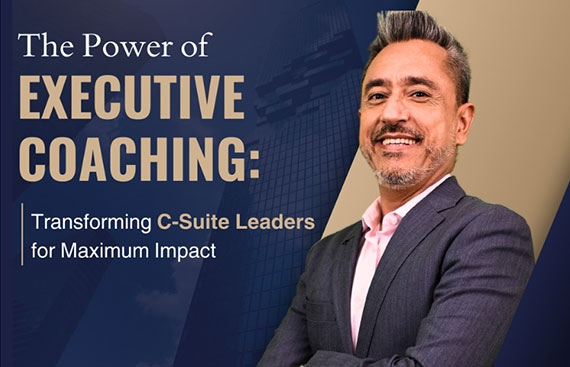The Power of Executive Coaching: Transforming C-Suite Leaders for Maximum Impact

In a fast-evolving business landscape, executive coaching is quietly reshaping how India’s top leaders think, decide, and lead.
For most of their careers, CEOs and senior executives are seen as the ones with all the answers. They’re the vision-holders, the problem-solvers, the final word in the room.
But increasingly, a quiet question is surfacing at the top:
Who's helping me grow, now that I’m here?
That question is powering a major shift in how modern organisations approach leadership.
Executive coaching, once viewed as optional or remedial, is now emerging as a high-stakes advantage for leaders who want to sharpen impact, not just extend tenure.
Dr. Ameet Parekh, who works closely with CXOs through his C-Suite Championship Circuit, believes the stakes have never been higher.
“There comes a point where more information stops helping. Leaders don’t need another framework. They need a space to see themselves clearly.” — Dr. Ameet Parekh
Why Smart Leaders Plateau
Many executives are managing scale, pressure, and complexity like never before. But the real blockers often aren’t external.
They’re internal:
- Subconscious patterns
- Inherited beliefs
- Emotional responses dressed up as efficiency
Dr. Ameet Parekh suggests executive coaching works precisely because it doesn’t offer advice, it offers reflection.
And that’s where coaching steps in.
The shift is quiet but the impact is clear:
- More focused decisions
- Less reactivity in execution
- Stronger team energy
Not because the business changed. Because the person leading it did.
Coaching Is Not Mentorship. It’s Not Therapy. It’s a Strategic Upgrade.
Despite its rise, executive coaching is still often misunderstood. It’s not motivational talk. It’s not advice-giving. And it’s definitely not soft.
The best coaching relationships are direct, structured, and grounded in trust.
Dr. Ameet Parekh believes the best coaches help leaders:
- Spot internal blockers they’ve normalized
- Reframe persistent leadership challenges
- Stay calm under pressure
- Increase decision velocity without creating chaos
In essence, coaching brings clarity. And clarity drives strategy not from urgency, but from depth.
“The role of a coach is to help you lead as the person you’re becoming, not the version you’ve already mastered.” — Dr. Parekh
The Coaching Conversation Is Changing
A decade ago, executive coaching was hidden behind closed doors. Now, it’s becoming a core pillar of enterprise leadership.
Through the C-Suite Championship Circuit,
- CFOs use coaching to lead transformation
- Founders use it to rebuild identity after scale
- CEOs use it to get the kind of challenge no one else in the room can give
The most common feedback?
“I should’ve started sooner.”
Quiet Space. Loud Impact.
One of the most underrated benefits of executive coaching is the space it creates:
- Space to think without reacting
- Reflect without posturing
- Grow without performing
And in that space, the most strategic decisions are made not just for this quarter, but for the next few years.
Executives report:
- More focused conversations
- Better team alignment
- Tighter execution without micromanagement
- A renewed sense of purpose and energy
The Real ROI of Coaching
In today’s leadership landscape, coaching isn’t remedial.
Dr. Ameet Parekh is seeing this shift unfold across sectors—from legacy businesses to tech-driven enterprises.
The next generation of leadership is defined by consciousness.
Because at this level, the real competitive edge isn’t just strategy—it’s self-mastery.
And the leaders investing in that now are quietly shaping what the next decade of leadership looks like.
